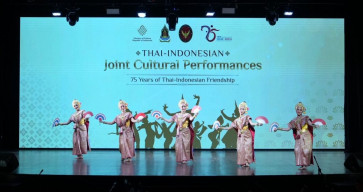Popular Reads
Top Results
Can't find what you're looking for?
View all search resultsPopular Reads
Top Results
Can't find what you're looking for?
View all search resultsEd Iskandar: Creating own home through directing theater
Courtesy of Ed Iskandar Living in a land far from his family, Ed Sylvanus Iskandar tried to create his own version of home through the thing he has always loved most: the theater
Change text size
Gift Premium Articles
to Anyone
C
em>Courtesy of Ed Iskandar Living in a land far from his family, Ed Sylvanus Iskandar tried to create his own version of home through the thing he has always loved most: the theater.
With the magic found in it, he built a “new family” with an Indonesian taste in his theater community.
“My theater making has always been about the desire to see community manifest around me, where you can belong to a group — the thing you find a lot in Indonesian culture. Part of that is to do with the fact that I left home when I was 7 to start boarding school,” the 31-year-old theater director said during a short visit to Jakarta recently.
“And I can remember so powerfully the moment when I realized I was in a strange land, in a country where I didn’t really speak the language and I needed to find a way to build a family around myself.”
Ed took a visit home to Jakarta amid his tight schedule taking care of his latest play, Venus in Fur, which was staged at the Singapore Repertory Theater.
The life of the New York-based director has never been far from the arts since he was little. He first got in touch with it through music during his teenage years.
Despite the joy he found in music, he realized that he felt lonely. So at the age of 16 and 17, he started looking for a way to extend his love for the arts in which the process of making art was more communally based.
“I did theater and I thought it was the ideal thing. Theater was a great community, not just for the art makers who spend so much time together creating something, and you also develop intense friendships that way, which I’ve always loved. I think that’s how I fell in love with it,” Ed said.
As a student at Harrow High School in England, Ed played a lot of Shakespeare, musicals and other plays, but somehow he knew he would not want to be a professional theater actor for a career.
A moment of consequence occurred when he watched a Hedda Gabler play, and it fundamentally changed his life.
“I remember the lead actress did a weird tour around the stage at the end of the play, and I just knew it was the wrong move and I had this powerful instinct of ‘that’s wrong I can fix that’. That’s the first moment I started to think about directing,” Ed said.
Shortly after, he began to prepare his first play, adapting the text of American playwright David Mamet’s Sexual Perversity in Chicago. He chose it as his first project as he wanted to create a refreshing play.
As a young man in England, Ed said, most of the time he read Oscar Wilde, Bernard Shaw and others with their elevated language and polite morals.
“David Mamet was like the bad boy of American theater, and people were so crazy about his play. They talked about sex, the effects of sex and it was an intoxicating world; and I found language I didn’t understand and people I found fascinating,” he said.
Helped by his teacher and friends, his first project was featured at a festival, and turned out to be a learning experience for Ed.
“It was a terrible production, but it’s still something I think of with fondness. It was a fun way to discover myself,” Ed recalled.
At 18, he moved to the United States to study modern thought and literature at Stanford University. He always tried to find time to direct in between classes and directed over 50 plays over the course of five years.
He took another three years of study, taking a Master of fine arts program at Carnegie Mellon University in Pittsburgh, Pennsylvania, to better equip himself with all aspects of directing and theater.
Ed relocated to New York after graduation to expand his career in theater. And there, he found a missing theatre culture he had long wished to see.
“Back in the 14th or 15th century, there was always a big communal culture to watch the play. The Greeks did it, English people did it too and it used to be fundamental. It’s gone today, people only come to watch, and go somewhere else to sit down and have a meal afterwards,” he said.
“At that time I feel like all these things should happen at the same place.”
He co founded a collective called Exit, Pursued by a Bear (EPBB), taken from a stage direction in Shakespeare’s Winter’s Tale, in 2010 that was set up with some purpose to revitalize the culture.
“For artists it was set up to be a theater gym. Theater artists who are not working can exercise here because they have to be at their best at the moment they get work. And it’s become something else entirely because we still ought to get together whenever we work,” he said.
EPBB has nine voluntarily staff members and is based in his Manhattan loft, which can fit up to 60 people. He said those who want to come to the EPBB’s free event would receive a confirmation for reservation by email, and get the location and password a day before.
“When you’re there, drinks will be served, a little bit of a social break before the piece you’re going to see; the actors will serve you home-cooked dinner made by ourselves before the show, and you will watch the play. It will turn into a late night lounge, and you get to hang out until late,” Ed, who loves cooking, said.
“It’s all free, and maybe that’s why it’s so popular in New York,” Ed said.
EPBB has also become Ed’s incubation space to prepare a piece. So far, he has incubated seven plays. He is currently working on Bacha Bazi, a Broadway option play.
Ed had slowly built his signature with his own style in the international theatre setting, but as an Indonesian, he has always wanted to bring more of Indonesian-themed plays onto the world’s stage.
He did Arok of Java in 2011, an Indonesian legend adapted by Jason Williamson, with a multinational cast and only one New York-based Indonesian actor in the play.
“That was my baby step, and I’d love to continue it. I like to make stories about Indonesia, because they’re not common in the West, and I want to be an Indonesian who takes the story there,” he said.
Despite the craziness he often faced in directing, he found the challenges motivating.
“I like the challenge of not knowing what to do at the first rehearsal. I think that’s the way my mind works and I love that I can’t ever figure out the theatre puzzle,” he said.
“Theater involves 20 other human beings or more, you can’t expect perfection. It’s about motivating life in a piece so that everybody on stage feels excited and alive and in dialogue with the people around them,” Ed said.










